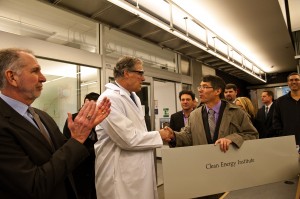By Hannah Hickey
World leaders gathered in Paris in December to forge a global agreement to limit planet-warming carbon emissions. Similar summits had been held before, but the summit was the first this century to end with an international agreement. The U.S., China and other countries will sign the document into law on Friday – appropriately enough, Earth Day.
The Paris talks were attended by thousands of delegates, including four undergraduates from the University of Washington. At the time, UW researchers in Seattle applauded the expansion of discussions to include public policy and human health, and emphasized the need for a timely, durable international agreement.
Now, a few UW faculty members comment on the signing as countries move toward implementing its contents.
Dennis Hartmann, a UW professor of atmospheric sciences, calls the signing an “encouraging” step forward. But he notes that the United Nations Framework Convention on Climate Change was adopted in 1992, and theKyoto Protocol was signed in 1997, but never ratified by the U.S.
Since then, he said, the world has emitted more carbon dioxide than even the highest expert predictions at that time. The Paris Agreement‘s commitments are voluntary, he noted, with no mechanisms for enforcement, and its goals are modest.
“Much more aggressive steps are necessary to keep global warming in check, and time is running out,” Hartmann said. “The 2013 Intergovernmental Panel on Climate Change report [on which he was a lead author] showed that we are about halfway to the amount of greenhouse gas emissions that will produce 2 degrees Celsius of warming, and at present rates of release we will get there in about 25 years. We need to stop the increase in carbon dioxide to avert 2 C of warming, and the promises under the Paris Agreement will not achieve that. We need nations to do much more.”
LuAnne Thompson, UW professor of oceanography and director of the UW Program on Climate Change, said the agreement “represents an important step for the international community in its effort to ‘limit dangerous inference of the climate’ as set out [in 1992] by the UN Framework Convention on Climate Change.”
She noted that each country sets its own voluntary targets. “Because of this bottom-up approach, the country pledges are more aspirational than was found in Kyoto, potentially resulting in much larger emission reductions than many thought possible.”
She added: “While some have said that the bold goal set in Paris of keeping warming below 2 C is unrealistic, the Paris Agreement gives confidence that the international community can work together to solve this defining challenge of this century. I am hoping for swift ratification of this agreement, and that countries with both large and small emissions pledge significant reductions in emissions.”

Governor Jay Inslee visited campus December 12, 2013 to help launch the Clean Energy Institute
Aseem Prakash, a UW professor of political science and director of the UW Center for Environmental Politics, said “the Paris Agreement is a good step forward because China and India, along with industrialized countries, are on board.”
But he noted the pledges are voluntary. “Kyoto and other international agreements show that international agreements with mandatory targets face huge problems in domestic translation and implementation.”
He echoed others on the voluntary targets, and the lack of incentives to meet them. “This holds not only for China and India, but also for the U.S., where the Congress remains opposed to climate-change mitigation.” Prakash said he would like to see country-specific plans and budgets “before speculating on the possibility of the success of the Paris agreement.”
Scott L. Montgomery, a lecturer in the UW Jackson School of International Studies who writes on international relations and geopolitics, said “overall, it represents an essential step, a major move forward.”
But he wondered about the agreement’s focus on renewables — mainly solar and wind — rather than other options such as hydropower, fossil fuels with capture of carbon emissions, and especially nuclear power.
“We have seen, in the 1970s and 80s, what harm can be done by exaggerated claims about what renewable technologies can actually deliver,” Montgomery said. “Reducing carbon emissions significantly will require every means at our disposal.”
Nives Dolšak, a UW professor of marine and environmental affairs, called it “mission impossible.” She said: “We have a global-emissions goal we are not sure is correct, national goals that are in no way connected to it, and we really will [have no way to] know if we met it or not.”
She described the agreement’s more than $100 billion pledge per year to help developing countries enact new technology and mitigate and adapt to a changing climate as inadequate.
Daniel Schwartz, a UW professor of chemical engineering and director of the UW Clean Energy Institute, said that “the Paris Climate Agreement — combined with the [governmental]Mission Innovation and [private] Breakthrough Energy Coalition pledges to invest billions of new dollars in clean energy — is a signal that the world is committed to accelerating the development of scalable clean energy innovations.”
He noted that Washington state has already invested in the Clean Energy Institute and other efforts that join university researchers and national labs to develop new materials for renewable energy and integrate them into the electrical grid.
“What we need now is an ecosystem that has more fundamental scientific discoveries happening within earshot of the entrepreneurs and investors who share this same sense of urgency to mobilize against an environmental challenge that many of the world’s most powerful nations now recognize as a great threat to humanity.”
Salina Abraham, a UW undergraduate in environmental sciences, forestry and economics who attended the summit as part of the International Forestry Students’ Association, said “to me, the signing of the Paris climate agreement is a signal — the sound of a call from the global world to this generation’s young professionals and students.
“It is telling us that we need to begin crafting creative solutions to accomplish these ambitious goals — this need stretches from finance to agriculture, international trade to urban design.”
Abraham recalls meeting people from around the world during her time in Paris.
“We all have a part to play, and the agreement is the reminder that we are not alone. In each country, each city, there will be hordes of people working to meet the goals of the agreement — and it is this new truth that I believe will make all the difference.”
###




